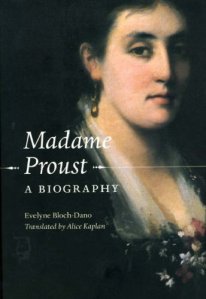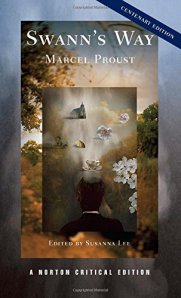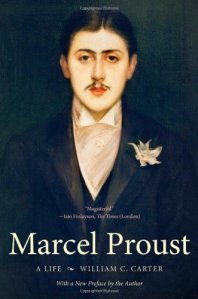 September
26
September
26
Tags
Marcel Proust and his Mother: A Unique Bond
 On the 26th of September 1905, Jeanne Clémence Weil, mother of writer Marcel Proust, died in Ile de France, Paris. Madame Proust, as she was to be known, seeing as Marcel never got married, was born Jewish on both sides of her family. Her genealogy actually shows that Marcel Proust and Karl Marx were distant cousins, albeit seven generations apart. Jeanne was a sensitive, very intelligent, and well-educated young woman who had a deep understanding of music and literature. Her schooling had been primarily classical and because at the time girls could not attend the lycées which served as preparatory schools for higher education, Jeanne studied at home, probably with private tutors. Jeanne’s wealthy parents married her off to the Catholic Dr. Adrien Proust in 1870 and she had two sons, Robert and Marcel. Her presence is strongly felt in Marcel Proust’s In Search of Lost Time, which opens with one of the best known scenes in literary history, as young Marcel, unable to fall asleep, waits restlessly for his mother to come and give him a goodnight kiss:
On the 26th of September 1905, Jeanne Clémence Weil, mother of writer Marcel Proust, died in Ile de France, Paris. Madame Proust, as she was to be known, seeing as Marcel never got married, was born Jewish on both sides of her family. Her genealogy actually shows that Marcel Proust and Karl Marx were distant cousins, albeit seven generations apart. Jeanne was a sensitive, very intelligent, and well-educated young woman who had a deep understanding of music and literature. Her schooling had been primarily classical and because at the time girls could not attend the lycées which served as preparatory schools for higher education, Jeanne studied at home, probably with private tutors. Jeanne’s wealthy parents married her off to the Catholic Dr. Adrien Proust in 1870 and she had two sons, Robert and Marcel. Her presence is strongly felt in Marcel Proust’s In Search of Lost Time, which opens with one of the best known scenes in literary history, as young Marcel, unable to fall asleep, waits restlessly for his mother to come and give him a goodnight kiss:
“My sole consolation when I went upstairs for the night was that Mamma would come in and kiss me after I was in bed. But this good night lasted for so short a time: she went down again so soon that the moment in which I heard her climb the stairs, and then caught the sound of her garden dress of blue muslin, from which hung little tassels of plaited straw, rustling along the double-doored corridor, was for me a moment of the keenest sorrow. So much did I love that good night that I reached the stage of hoping that it would come as late as possible, so as to prolong the time of respite during which Mamma would not yet have appeared. Sometimes when, after kissing me, she opened the door to go, I longed to call her back, to say to her “Kiss me just once again,” but I knew that then she would at once look displeased, for the concession which she made to my wretchedness and agitation in coming up to me with this kiss of peace always annoyed my father, who thought such ceremonies absurd, and she would have liked to try to induce me to outgrow the need, the custom of having her there at all, which was a very different thing from letting the custom grow up of my asking her for an additional kiss when she was already crossing the threshold. And to see her look displeased destroyed all the sense of tranquillity she had brought me a moment before, when she bent her loving face down over my bed, and held it out to me like a Host, for an act of Communion in which my lips might drink deeply the sense of her real presence, and with it the power to sleep.” (Marcel Proust, À la recherche du temps perdu, Volume One: Swann’s Way, 1913).
His mother’s strong character had a decisive influence on the great writer’s career. The only real biography of Jeanne is so far Evelyne Bloch-Dano’s book Madame Proust which tries to reveal the real Jeanne Weil Proust, covering her life and times from her German-Jewish background and her marriage to a Catholic grocer’s son to her lifelong worries about her son’s sexuality, health problems, and talent. The book offers valuable insight into the Prousts’ daily existence, but also a cultural evaluation of fin de siecle France, including high society, spa culture, Jewish integration, and the Dreyfus affair. It seems that, although Proust’s parents came from different religions, their atheism equalled out their differences. However, during the Dreyfus affair, some schisms appeared, which ultimately brought Jeanne even closer to her son Marcel. They both defended Drefus’ innocence, while Dr. Proust held him as a traitor.
 From Bloch-Dano’s biography of Jeanne, we learn that “Marcel Proust’s relationship with his mother, like much else to do with this greatest of all novelists, was exceptional.The passages in A La Recherche du Temps Perdu concerning his goodnight kiss are among the most memorable in the entire novel. When, aged 25, he made a short visit to Fontainebleau, he wrote to his mother twice a day and made frequent phone calls in-between. After her death, he wrote to Robert de Montesquiou: “My life has now forever lost its only purpose, its only sweetness, its only love, its only consolation.” (…) Whatever her marital dissatisfactions, Madame Proust found ample compensation in her sons. She doggedly protected Marcel in childhood and alternately cajoled and chid during his twenties and thirties. Her resigned, if not wholly relaxed, attitude to his sexuality can be inferred from his description of a new friend who has gone “overboard” on him: “I say overboard in a good sense, so don’t go imagining that it’s an evil connection, great gods!!!” (Michael Arditti ‘Mother of all novels’, review of Madame Proust, By Evelyne Bloch-Dano, trans Alice Kaplan, The Independent, Friday 16 November 2007).
From Bloch-Dano’s biography of Jeanne, we learn that “Marcel Proust’s relationship with his mother, like much else to do with this greatest of all novelists, was exceptional.The passages in A La Recherche du Temps Perdu concerning his goodnight kiss are among the most memorable in the entire novel. When, aged 25, he made a short visit to Fontainebleau, he wrote to his mother twice a day and made frequent phone calls in-between. After her death, he wrote to Robert de Montesquiou: “My life has now forever lost its only purpose, its only sweetness, its only love, its only consolation.” (…) Whatever her marital dissatisfactions, Madame Proust found ample compensation in her sons. She doggedly protected Marcel in childhood and alternately cajoled and chid during his twenties and thirties. Her resigned, if not wholly relaxed, attitude to his sexuality can be inferred from his description of a new friend who has gone “overboard” on him: “I say overboard in a good sense, so don’t go imagining that it’s an evil connection, great gods!!!” (Michael Arditti ‘Mother of all novels’, review of Madame Proust, By Evelyne Bloch-Dano, trans Alice Kaplan, The Independent, Friday 16 November 2007).
“Their relationship was intense; everyone knows that. What is made evident here is its complicated nature. To put it briefly: Marcel wanted simultaneously to be independent and to remain the little boy who was the centre of his mother’s world (significantly, the narrator of A la recherche is an only child, brother Robert having been excised, though in life the brothers were close). Madame Proust also wanted Marcel to remain a little boy and to be independent of her. But though each wanted the same things they wanted them at different times. When she and Adrien Proust tried to force independence on him, the little child resisted and sought to climb back into the maternal ark. When he struck out independently, Jeanne seized hold of the reins and drew him back. So their love was rarely smooth; both experienced resentment. They quarrelled fiercely, so that the reconciliation might be all the sweeter. It was the most intense love-affair of Proust’s life. Bloch-Dano is in no doubt that Jeanne recognised that Marcel was homosexual. But it was the one thing they could not talk about. Silence deepened his guilt and fed his resentment. Her death desolated him and yet liberated him to yield to the impulses he cherished and despised. She helped him in his work, doing much of the first draft of the translation of Ruskin’s Bible of Amiens for him (her grasp of English was much better than his). ‘Jeanne realized that the qualities her son lacked most were will power and perseverance. She persisted in helping him acquire them … Her confidence, her vigilance, her intelligence, her demands, and her love were the crucibles forging the iron will that would one day enable Marcel to go the distance. She would never see her efforts crowned.’ One wonders if her death wasn’t necessary to enable him at last to embark on the novel. It was to become what she had been: his ark.” (Allan Massie, ‘Mummy Dearest’, review of Madame Proust: A Biography, By Evelyne Bloch-Dano, Literary Review).
The thought of his mother perishing obsessed Marcel. On 1 February 1907, two years after she passed away, he published a long article on the front page of the Le Figaro about a man who had killed his mother – and then killed himself. The subject obviously presented inconceivable horrors to Marcel. In an exceptional LRB article, Michael Wood discusses the multiple implications of  this unique mother and son relationship. “Michel Schneider says, ‘The mother and the son love each other to a degree they can’t cope with, they hate each other but they don’t know it,’ and Compagnon, with equal elegance, affirms that ‘the love of the mother includes the hatred of the mother,’ getting the genitives to do their double work, meaning love and hatred for and of each other. But what if these people don’t hate each other at all? What if they love each other in a mode of intricate, endless dependence?” (Michael Wood, ‘Proust and His Mother’, London Review of Books, Vol. 34 No. 6 · 22 March 2012). The thought of his mother getting old and disappearing from his life tormented the writer and her end devastated him. The spell she had on him seeped through his writing, nourishing it until the end of his life. So, thank you, Madame Proust!
this unique mother and son relationship. “Michel Schneider says, ‘The mother and the son love each other to a degree they can’t cope with, they hate each other but they don’t know it,’ and Compagnon, with equal elegance, affirms that ‘the love of the mother includes the hatred of the mother,’ getting the genitives to do their double work, meaning love and hatred for and of each other. But what if these people don’t hate each other at all? What if they love each other in a mode of intricate, endless dependence?” (Michael Wood, ‘Proust and His Mother’, London Review of Books, Vol. 34 No. 6 · 22 March 2012). The thought of his mother getting old and disappearing from his life tormented the writer and her end devastated him. The spell she had on him seeped through his writing, nourishing it until the end of his life. So, thank you, Madame Proust!










Reblogged this on Lenora's Culture Center and Foray into History.
LikeLike
very insightful
LikeLike
Pingback: Proust and his Time Capsule of Curiosities